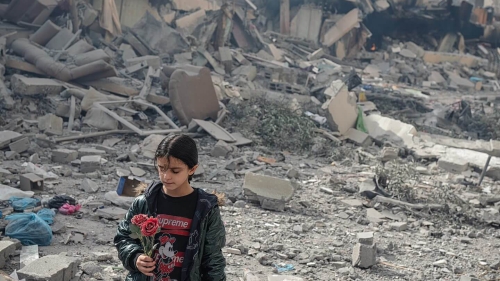Belgium Court Defies International Law
The decision of the Belgium court to halt the investigation of Israeli Prime Minister Ariel Sharon is a set back for international law and, more importantly, all of humanity. The Belgium court did not address the legal principles or moral underpinnings of the complaint filed in June 2001, by a group of Palestinian survivors from the Sabra and Shatila refugee camp massacres, but instead pointed to a legal technicality which has in turn eviscerated the significance and intent of the 1993 and 1999 Belgium legislation on universal jurisdiction of war crimes and crimes against humanity.
Sharon was Israel's defense minister when nearly 900 Palestinian refugees, almost all women, children and elderly, were slaughtered in cold blood by Lebanese militias supported by Israel. An Israeli inquiry found Sharon personally responsible, prompting his resignation as defense minister in 1983. Morris Draper, U.S. chief diplomat in the region at the time of the massacres, said recently that he had no doubt whatsoever about Sharon's responsibility in the massacres at Sabra and Shatila.
The Court's decision was based on an analysis of Belgium law, which concluded that no investigation could be brought in Belgium for war crimes, crimes against humanity and genocide unless the suspect is found in the country. This decision not only runs counter to the intent of the Belgium legislation which specifically conferred powers upon the judiciary to extend the scope of law to such crimes under universal jurisdiction, but the ruling also defies the tenants of international law which confer the powers of universal jurisdiction for the prosecution of those who commit grave breaches against humanity.
In fact, the four Geneva Conventions (Geneva Convention I, Art. 49: Geneva Convention II, Art. 50; Geneva Convention III, Art. 129; Geneva Convention IV, Art. 146) confers the right of any state to open an inquiry of grave breaches and to extradite suspects without necessitating that the breaching parties be present in the states jurisdiction, as long as they have prima facie evidence concerning the possible criminal responsibility of the suspect.
It states, "The High Contracting Parties undertake to enact any legislation necessary to provide effective penal sanctions for persons committing, or ordering to be committed, any grave breaches of the present Convention defined in the following Article 50 (Geneva Convention I). Each High Contracting Party shall be under the obligation to search for persons alleged to have committed, or to have ordered to be committed, such grave breaches, and shall bring such persons, regardless of their nationality, before its own courts. It may also, if it prefers, and in accordance with the provisions of its own legislation, hand such persons over for trial to another High Contracting Party concerned, provided such High Contracting Party has made out a prima facie case."
Furthermore, international law does not declare that government officials are immune from prosecution in foreign courts for war crimes and crimes against humanity while in office. As stated in Article 7 of the Nuremberg Charter, [T]he official position of defendants, whether as Heads of State or responsible officials in Government Departments, shall not be considered as freeing them from responsibility or mitigating punishment." The Nuremberg Tribunal made clear that under customary international law and general principles of law the official position of a state official does not protect that official from prosecution for a crime under international law.
... The principle of international law, which under certain circumstances protects the representative of a state, cannot be applied to acts, which are condemned as criminal by international law. The authors of these acts cannot shelter themselves behind their official position in order to be freed from punishment in appropriate proceedings.
. . . [T]he very essence of the Charter is that individuals have international duties, which transcend the national obligations of obedience imposed, by the individual state. He who violates the laws of war cannot obtain immunity while acting in pursuance of the authority of the state if the state in authorizing action moves outside its competence under international law."
Article 13 of the 1991 Draft Code of Crimes against the Peace and Security of Mankind, intended to be applicable in both national and international criminal courts, provided:
''The official position of an individual who commits a crime against the peace and security of mankind, and particularly the fact that he acts as head of State or Government, does not relieve him of criminal responsibility.''
The 1996 Draft Code of Crimes against the Peace and Security of Mankind, to be applied by national courts on the basis of universal jurisdiction, as well as by the International Criminal Court, reaffirms the principle of law recognized in the Nuremberg Charter. "The official position of an individual who commits a crime against the peace and security of mankind, even if he acted as head of State or Government, does not relieve him of criminal responsibility or mitigate punishment."
The International Law Commission reiterated why an official may not plead immunity as a bar to a prosecution in an international criminal court for crimes under international law:
"... Crimes against the peace and security of mankind often require the involvement of persons in positions of governmental authority who are capable of formulating plans or policies involving acts of exceptional gravity and magnitude. These crimes require the power to use or to authorize the use of the essential means of destruction and to mobilize the personnel required for carrying out these crimes. A government official who plans, instigates, authorizes or orders such crimes not only provides the means and the personnel required to commit the crime, but also abuses the authority and power entrusted to him. He may therefore, be considered to be even more culpable than the subordinate who actually commits the criminal act. It would be paradoxical to allow the individuals who are, in some respects, the most responsible for the crimes covered by the Code to invoke the sovereignty of the State and to hide behind the immunity that is conferred on them by virtue of their positions particularly since these heinous crimes shock the conscience of mankind, violate some of the most fundamental rules of international law and threaten international peace and security."
Similarly, "[I]t would be paradoxical to prevent an individual from invoking his official position to avoid responsibility for a crime only to permit him to invoke this same consideration to avoid the consequences of this responsibility. (See 1996 ILC Report, p.39-41).
The decision of the Belgium Appellate Court is a tremendous setback for justice and the attainment of universal human rights. While the international community righteously implores the parties of the Middle East to refrain from violence, it is counterintuitive to fathom how those who reject violence and embark on a course of justice within the constructive framework of the law can even have those rights extinguished without vision.
The hopes of the victims of Sabra and Shatila in ending the impunity for those responsible for the war crimes, crimes against humanity and genocide will not be dismissed as easily as the reflected by the decision of the Belgium courts. The absence of judicial recourse will not continue unchallenged by the world. Today, the Palestinians have incurred an obstacle on their path to vindicating their rights enshrined in international law and the Geneva Conventions. However, just as those who found justice following the war crimes committed during World War II, so will the Palestinian victims and all those who have been victim,s of such grave breaches against humanity.
Omar Fayez is an attorney of International Law (JD), based in Chicago.
Topics: Belgium, Crime And Justice, Crimes Against Humanity, Geneva Conventions, Government And Politics, Human Rights, International Law
Views: 1205
Related Suggestions

















